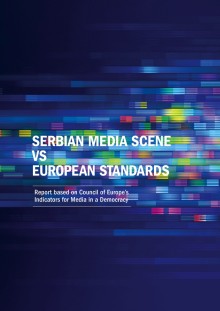09. 05. 2012
Publication "Serbian Media Scene VS European Standards"

The Publication "Serbian Media Scene VS European Standards" is the first complete report about the media situation in Serbia on the basis of 27 indicators of the Council of Europe for measuring freedom of expression, freedom of information and media freedom in one country. This report is the result of joint work of the organizations Civil Rights Defenders, ANEM, NUNS, NDNV and Local Press, and includes legal and communicological analysis of data on legal, political, economic and professional environment of the functioning of media in Serbia.
The presentation of the Publication titled "Serbian Media Scene VS European Standards" will be held in the Belgrade Media Centre on Friday, May 18, 2012, at 11 a.m.
The Publication is available in the attachment below.
This report used publicly available data on the media sector, as well as additional interviews conducted with: 240 chief editors of the news media from 79 towns in Serbia, 69 media owners, 40 party officials from 10 cities in Serbia, 50 members of nine ethnic minority communities and representatives of 26 state, regulatory and self-regulatory bodies with competence in the media sector.
The results show that only four out of 27 European standards of media freedoms are fully realized in Serbia: freedom to enter journalistic profession, freedom of access to the Internet and foreign media, separation between involvement in bodies of executive power and professional media activities and limitation of the right of media to exclusive reporting on major events of public importance.
For the most of other European standards, there is a relatively good legal basis for their implementation, but they are however not achieved in practice in a full or unproblematic way.
Drastic discrepancy from existing European standards is visible in the field of media economics and media independence from political influence, as well as social labor rights and safety of journalists.
The reasons for the inconsistence of domestic practice in the field of media economics and media independence are not only numerous weaknesses in regulation (inadequate treatment of state ownership, lack of transparency of ownership and failing to prevent monopoly, the lack of neutrality in state financial aid, lack of legal instruments of protection of independent editorial policy), but also the social and structural factors that include transitional nature of the media system, economic power and interests of big media players, as well as the need of political forces to use media for reaching social consensus on the direction of development of the traumatized and divided society.
Apart from qualitative analysis of implementation of 27 standards of media freedoms and pointing to major problems, the report also contains many of current, quantitative indicators relating to 2011, as well as list of areas that are missing data that are important for assessing the situation in the media sector.
Here are highlights of the data for 2011:
- 26% TV and 25% radio broadcasters are state owned;
- out of a total of about 5 million Euros of state funds, nearly 4 million were allocated for funding current activities of four public media companies, whereas one million was allocated to more than 200 media throught projects;
- 14% of 240 surveyed top executives in the news media is against the privatization of the media (60% from the state and 40% from the private media), while 14% have no clear position on state media ownership;
- 73 cases of drastic violations of media freedoms and rights have been registered, out of which 9 physical attacks on journalists, 18 threats endangering safety and four discharges of chief editors or managers of media;
- only 2% of 240 surveyed chief editors of the news media thinks that the media freedoms and journalists' rights have been fully facilitated during the year;
- in 72% of surveyed media, average salary amounted to 30 thousand, while only in 3% it was over 50 thousand RSD;
- trade unions of journalists exist only in public media, while in private, if any, were inherited from the period before privatization;
- 72% of surveyed editors of the news media believes that the existing public broadcasting services are not protected from political interference in their daily work, while 66% thinks that in practice, the principle that people of clear party affiliation cannot get to high managerial positions is not respected;
- 70% of surveyed party officials, both from the government and the opposition, believes that the media does not respect the principle of equality in political reporting, while 92% of the chief editors believe that this principle is respected by their media;
- only 13% of chief editors of radio and TV broadcasters consider the work of regulatory bodies in 2011 unbiased and efficient;
- 88% of respondents engaged in the work of national minorities' national councils or minority media are not aware of a single successfully privatized media in minority language, while 72% thought that the national minorities' national councils have instruments that can significantly improve the operation and development of minority media.

This Report/Publication was prepared in cooperation with the Civil Rights Defenders and financial support from the Swedish International Development Cooperation Agency (Sida)
The Publication "Serbian Media Scene VS European Standards" is available here
-
No comments on this topic.





